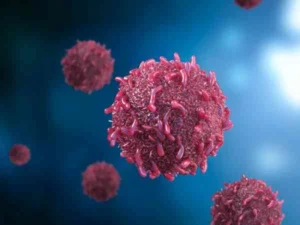An Introduction to Eating Right for Chemotherapy Patients
Eating the right foods is very important for cancer survivors. It helps them feel better and stay healthier in the long run. Oncology nurses can make a big difference by helping patients understand about the right nutrition and encouraging them to live a healthy lifestyle.
What the Studies Say?
Researchers tell how diet can affect the health of cancer survivors, from the time of diagnosis through to long-term recovery. Many cancer patients suffer from issues such as loss of appetite and eating disorders during treatment. Which can lead to weight loss and affect their health. To help with this, medical professionals recommend nutritious foods such as peanut butter, yogurt, and fruit, which provide important calories and nutrients. They also recommend smaller, more frequent meals and liquid supplements for those who have difficulty eating solid foods.

On the other hand, being overweight or obese can pose a risk to cancer survivors, making them more likely to have cancer recur and affecting their overall health. It is important to control weight through a balanced diet and regular exercise. Guidelines recommend that overweight people lose weight gradually, under medical supervision, to no more than 2 pounds per week. This approach includes portion control and choosing foods that are low in calories but high in nutrients. Such as vegetables and whole grains. In addition, dietary patterns that emphasize fruits, vegetables, and whole grains reduce the risk of recurrence of cancer and other chronic diseases. Avoiding red and processed meats, limiting sugar intake, and moderate alcohol intake are also important.
Health behavior change plays an important role in survival. Many cancer survivors may need support to adopt healthier lifestyles, such as increasing physical activity and eating foods for Chemotherapy. Healthcare providers can help by offering advice and customized plans that address individual needs and challenges. This support aims not only to improve survival rates but also to improve the overall quality of life for cancer survivors.
15 Best Foods for Chemotherapy Patients
1. Brocculi

Sulforaphane is a natural compound found in vegetables such as broccoli, kale, and cabbage that has been gaining attention for its ability to prevent and fight various types of cancer. It works by blocking processes in the body that can cause cancer, such as inflammation and abnormal cell growth.
- Studies have shown that sulforaphane is particularly effective against cancers such as prostate, breast, colon, skin, bladder, and oral cancers. You can get sulforaphane by eating these vegetables regularly or by taking a dietary supplement called broccoli extract, which is rich in this beneficial substance.
2. Berries

Berries also known as Synsepalum dulcificum, is a fruit that can transform sourness and sweetness thanks to a compound called miraculin. Due to its flavor-altering abilities, this berry is rich in antioxidants, including terpenoids, phenolic compounds, and flavonoids. These antioxidants help fight oxidative stress in the body, which have many chronic diseases, including cancer. Research has shown that berries may also improve insulin resistance and stop cancer cell growth in laboratory studies.
3. Tomatoes

Some studies suggest that a diet high in tomatoes and lycopene may potentially reduce the risk of cancer, especially prostate cancer. Another study says that a higher intake of lycopene was associated with a lower risk of mouth, throat, and esophageal cancer.
4. Garlic

Research has shown that garlic and garlic extracts may reduce the risk of cancer. Allicin, a compound found in garlic, has been shown to provide potential benefits to cancer patients through a variety of mechanisms. Research suggests that allicin has anti-cancer properties that inhibit the growth and spread of cancer cells. It may trigger apoptosis, or programmed cell death, in cancer cells, which may help reduce tumor size.
Allicin also has antioxidant properties, meaning it can neutralize harmful free radicals that contribute to cancer development. Additionally, allicin may improve the immune system’s ability to fight cancer cells and reduce inflammation often associated with cancer progression.
5. Green Tea

Chemotherapy can cause problems such as drug resistance and side effects, so drug combinations, so-called drug cocktails, are increasingly being used to enhance efficacy. Green tea, known for its health-promoting effects, contains catechins, a type of flavanol. Studies have investigated how combining green tea extracts or catechins with anticancer drugs can improve treatment outcomes and reduce side effects. Research suggests that these combinations may synergistically enhance anticancer efficacy while reducing drug toxicity.
6. Turmeric

Curcumin is a compound found in turmeric that gives it its yellow color and provides a variety of health benefits. It has attracted attention for its potential in preventing and treating various types of cancer. Studies have shown that curcumin inhibits the formation and spread of tumors by blocking angiogenesis (blood vessel growth in tumors), triggering apoptosis (programmed cell death), and interrupting the cancer cell proliferation cycle.
7. Carrots

Carrots are eaten worldwide and are thought to potentially reduce the risk of several types of cancer, including colorectal cancer (CRC). They contain natural compounds such as falcarinol (FaOH) and falcarindiol (FaDOH), which have anti-inflammatory and anti-cancer properties. A recent study in Denmark investigated whether eating carrots could reduce the risk of colon cancer. The study suggests that regular consumption of moderate amounts of raw carrots may help prevent colon cancer, supporting the findings of previous animal studies.
8. Spinach

Spinach may help reduce the risk of cancer due to its rich nutrients, including vitamins A, C, E, beta-carotene, and folate. These nutrients act as antioxidants, fighting harmful free radicals that can cause cell damage that leads to cancer. Spinach also has anti-inflammatory properties that may reduce chronic inflammation associated with cancer. It may support DNA repair, regulate cell growth, and prevent abnormal cell growth. Additionally, the fiber in spinach promotes digestive health. This may be linked to a lower risk of colon cancer. While spinach is beneficial, a balanced diet and healthy lifestyle are essential for overall cancer prevention and health.
9. Nuts

Nuts may reduce your risk of cancer due to their nutritional content. They are rich in vitamins, minerals, healthy fats and antioxidants, all of which play a role in protecting cells from damage that can lead to cancer. For example, compounds such as ellagic acid and phytochemicals found in nuts can stop cancer cells from growing. Nuts also contain dietary fiber, which benefits digestion and overall health. Including nuts in your diet along with fruits, vegetables and whole grains can contribute to a healthier lifestyle and reduce your risk of cancer.
10. Flaxseeds

Flaxseed is a tiny seed with great health benefits, including potential cancer prevention. It’s packed with fiber, omega-3 fatty acids, and lignans, which are plant substances with antioxidant properties. These antioxidants help protect cells from damage that can lead to cancer. Flaxseed specifically reduces the risk of breast, prostate, and colon cancer. It also has anti-inflammatory properties that support overall health. Incorporating flaxseed into your diet, whether you sprinkle it on your yogurt or add it to a smoothie, is an easy way to reap its potential health benefits, including cancer prevention.
11. Cruciferous Vegetables (Cauliflower, Brussels Sprouts)

Cruciferous vegetables, such as broccoli, cauliflower, Brussels sprouts, and kale, are rich in nutrients and are known to have anti-cancer properties. They contain compounds called glucosinolates, which break down into biologically active compounds such as indoles and isothiocyanates when chewed or crushed. These compounds have anti-cancer effects by detoxifying carcinogens. They inhibit cancer cell growth, and even promoting cancer cell death.
12. Beans (Lentils, Chickpeas, Black Beans)

Beans, such as lentils, chickpeas, and black beans, are nutritious foods that offer several health benefits, including cancer prevention. They are a good source of protein, fiber, vitamins, and minerals. Their fiber content helps maintain a healthy digestive system and may reduce the risk of colon cancer. In addition, beans contain phytochemicals, such as flavonoids and saponins, which have antioxidant properties and protect cells from damage that can lead to cancer.
13. Whole Grains (Brown Rice, Quinoa, Oats)

Whole grains, such as brown rice, quinoa, and oats, are good for your overall health. They are rich in dietary fiber, vitamins, minerals, and antioxidants. The fiber in whole grains contributes to healthy digestion and may reduce your risk of colon cancer. The antioxidants in whole grains, such as phenolic compounds, protect your cells from damage caused by harmful molecules called free radicals. Whole grains also have a low glycemic index. They help in regulate blood sugar levels and may reduce your risk of insulin resistance and type 2 diabetes.
14. Sweet Potatoes

Sweet potatoes are packed with nutrients that contribute to overall health and may reduce the risk of cancer. They’re rich in beta-carotene, a powerful antioxidant that gives them their vibrant orange color. Beta-carotene is converted in the body to vitamin A, which supports immune function and skin health. Sweet potatoes also contain other antioxidants, such as vitamin C and quercetin. They protect cells from damage caused by free radicals. Plus, they’re rich in dietary fiber, which aids digestion and may reduce the risk of colon cancer.
15. Grapes

Grapes have health-promoting properties, including a potential role in cancer prevention. They contain powerful antioxidants, such as resveratrol, quercetin, and catechin. They help protect cells from damage caused by harmful molecules called free radicals. Resveratrol, found primarily in red grapes, has been studied for its anti-inflammatory and anti-cancer effects on various types of cancer cells. Grapes also contain vitamin C and other phytonutrients that support immune function and overall health.
Summing up,
Eating these foods for Chemotherapy provides your body with important substances, like nutrients and antioxidants, that keep you healthy, fight swelling, and in some cases, prevent cancer from coming back. Be sure to talk to your doctor or nurse before making any major changes to your diet during treatment. By focusing on a balanced diet, weight management, and a healthy lifestyle, medical professionals can help survivors improve their health.






